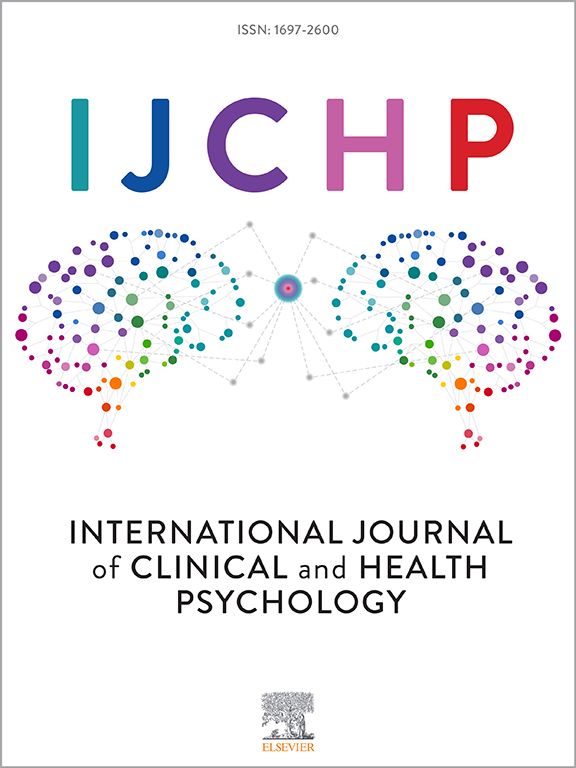Multimodal assessment of acute stress dynamics using an aversive video paradigm (AVP)
IF 4.4
1区 心理学
Q1 PSYCHOLOGY, CLINICAL
International Journal of Clinical and Health Psychology
Pub Date : 2025-07-01
DOI:10.1016/j.ijchp.2025.100607
引用次数: 0
Abstract
This study explored the efficacy of inducing stress through aversive video clips and investigated its impact on psychological processes, brain, and vegetative physiology. This study had a randomized, single-blinded, crossover design, where 78 right-handed male participants were exposed to aversive or neutral video clips in separate sessions. Subjective feelings of stress were assessed via questionnaires. Electroencephalography (EEG) with 62 electrodes was recorded continuously. EEG power and connectivity changes based on coherence were analyzed. Heart rate (HR) and heart rate variability (HRV) data were obtained during the whole experiment, and saliva was collected for cortisol and cytokine analysis at different time intervals. Subjective data showed increased anxiety and negative affect induced by the aversive video clips, accompanied by elevated salivary cortisol levels after exposure to the stressful clips and decreased HRV. Cytokine levels, however, increased over time in both control and stress conditions, which argues against a stress-specific alteration of cytokines in this specific stress protocol. EEG alterations during stress induction suggest a possible disruption of top-down control and increased bottom-up processing, in line with previous literature. These results suggest that the aversive video paradigm (AVP) is a reliable technique to induce psychological stress in a controlled experimental setting and is associated with stress-specific emotional and physiological changes.
基于厌恶视频范式(AVP)的急性应力动态多模态评估
本研究探讨了通过厌恶视频片段诱导应激的效果,并研究了其对心理过程、脑和植物生理的影响。这项研究采用随机、单盲、交叉设计,78名右撇子男性参与者在不同的环节中观看厌恶或中性的视频片段。主观压力感受通过问卷进行评估。连续记录62个电极的脑电图。分析了基于相干性的脑电功率和连通性变化。在整个实验过程中获取心率(HR)和心率变异性(HRV)数据,并在不同时间间隔采集唾液进行皮质醇和细胞因子分析。主观数据显示,厌恶视频片段引起的焦虑和负面情绪增加,伴随着应激视频片段后唾液皮质醇水平升高和HRV下降。然而,细胞因子水平在控制和应激条件下都随着时间的推移而增加,这反驳了在这种特定应激方案中细胞因子的应激特异性改变。与之前的文献一致,应激诱导期间的脑电图变化表明,自上而下的控制可能中断,自下而上的处理可能增加。这些结果表明,在一个可控的实验环境中,厌恶视频范式(AVP)是一种诱发心理应激的可靠技术,并与应激特异性的情绪和生理变化有关。
本文章由计算机程序翻译,如有差异,请以英文原文为准。
求助全文
约1分钟内获得全文
求助全文
来源期刊

International Journal of Clinical and Health Psychology
PSYCHOLOGY, CLINICAL-
CiteScore
10.70
自引率
5.70%
发文量
38
审稿时长
33 days
期刊介绍:
The International Journal of Clinical and Health Psychology is dedicated to publishing manuscripts with a strong emphasis on both basic and applied research, encompassing experimental, clinical, and theoretical contributions that advance the fields of Clinical and Health Psychology. With a focus on four core domains—clinical psychology and psychotherapy, psychopathology, health psychology, and clinical neurosciences—the IJCHP seeks to provide a comprehensive platform for scholarly discourse and innovation. The journal accepts Original Articles (empirical studies) and Review Articles. Manuscripts submitted to IJCHP should be original and not previously published or under consideration elsewhere. All signing authors must unanimously agree on the submitted version of the manuscript. By submitting their work, authors agree to transfer their copyrights to the Journal for the duration of the editorial process.
 求助内容:
求助内容: 应助结果提醒方式:
应助结果提醒方式:


